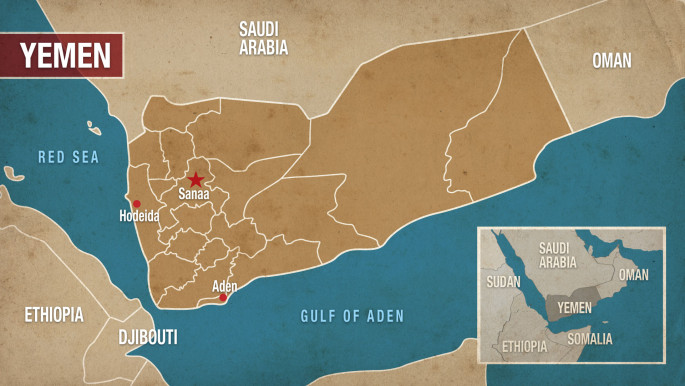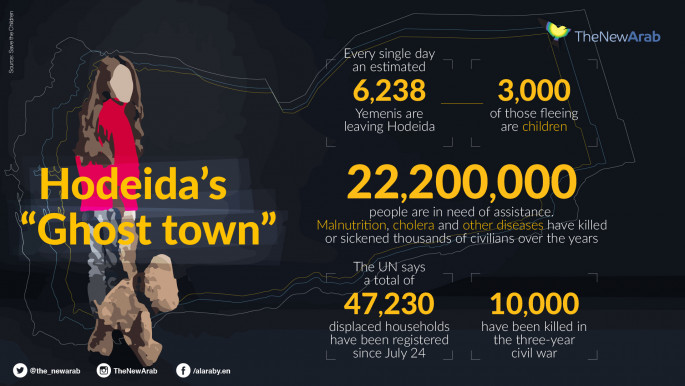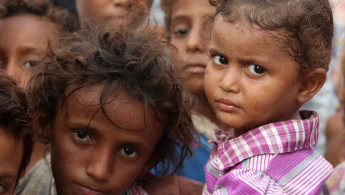Irreversible war and humanitarian catastrophe grip Yemen's Hodeida
The peace negotiations were scheduled to be launched on September 6, yet misfired prior to their kick-off. A rise of violence succeeded the failure of talks.
Yemeni government forces have lately mounted their military offensive in Hodeida while the Houthis have been putting up utmost resistance, sparking destructive confrontations and countless casualties. It is the bloodiest war Hodeida has undergone since the first push of the Yemeni government forces in June of this year.
"This escalation comes in response to their [Houthi] rejection of participation in the Geneva peace talks," said Mamoon al-Mahgami, a spokesman for the Yemeni force, the Giant Brigades.
While Hodeida has been under the grip of the rebels since 2014, the war now seems to be irreversible as the Saudi-led coalition continues to deploy massive forces and carry out extensive air bombardment.
Read also: Saudi-led offensive 'causing mass civilian casualties' in Yemen's Hodeida
Hodeida is in the depth of war and waiting for further decisive battles between the Saudi-backed government forces and Iran-allied Houthis.
Amid the recent surge of fighting, there is little or no room for diplomacy to defuse the war in Hodeida. Both sides are desperate to have control over the port city irrespective of the human or material costs.
 |
It is the bloodiest war Hodeida has undergone since the first push of the Yemeni government forces in June of this year... Both sides are desperate to have control over the port city irrespective of the human or material costs. |  |
The Houthis consider losing Hodeida as a moral and economic defeat while the Saudi-led Arab coalition believes the recapture would prevent weapon smuggling to the Houthis, rid them of the revenues they generate from the port and ultimately compel them to engage in serious peace negotiations.
So far, the fighting has severed the main route connecting Sanaa to Hodeida following the government seizure of strategic positions including Kilo 16 area.
The ongoing military gains have emboldened the government contingents of soldiers in the battlefield in Hodeida and formed a blow to the Houthi fighters. But scoring a victory in one battle may not be the end of war.
 |
|
Claiming keenness for peace
Both parties have been claiming their zeal for peace and have been trading accusations of obstructing the Yemen peace process.
While the coalition said the Houthis did not show up because they do not want peace, the latter keep pointing the finger of blame at the coalition.
This cycle of accusations and mistrust has been creating an environment conducive for nonstop hostilities.
Commenting on the military advance in Hodeida, Anwar Gargash, the Emirati minister of state for foreign affairs, said in a tweet that the Houthis' no-show was "further proof that the liberation of Hodeida is what is needed to bring them to their senses and constructively engage in the political process."
However, the Houthis argue that the Saudi-led coalition was behind the failure of peace talks.
In a televised speech this month, Houthi chief Abdulmalek al-Houthi stated: "We clearly know that the prime reason for the talks failure is the aggression coalition that obstructed the travel of our delegation from Sanaa to Geneva."
The Houthis raised some demands which went unmet, leading the peace talks to fall apart. They demanded that their wounded people be allowed to be transferred to Oman for treatment, their treated people abroad be repatriated and a guarantee that their delegation will be allowed to return to Yemen.
As the war rages on nowadays, UN envoy to Yemen Martin Griffiths, persists his efforts to initiate the peace talks and bring the warring sides to the negotiating table.
After the failed attempt, the envoy headed to Sanaa, deliberating with the Houthis in a bid to score a breakthrough. However, the ongoing military escalation reveals that Griffiths has hit a dead end thus far, and he has experienced his first setback this month since he assumed the post as the UN envoy to Yemen in February.
 |
We're particularly worried about the Red Sea mill, which currently has 45,000 metric tonnes of food inside, enough to feed 3.5 million people for a month. If the mills are damaged or disrupted, the human cost will be incalculable |  |
Horror and hunger
Presently, Hodeida is extremely perilous to live in or travel to. Over this month, civilians have been killed by airstrikes or shelling and many could face the same destiny in the days to come.
Moreover, a lack of access to food, water and medicine have been threatening thousands of lives, forcing several families to flee from their homes. Hodeida is undergoing a state of horror and hunger.
Read also: 'Babies too weak to cry': 5.2 million children at famine risk in Yemen
Lise Grande, UN humanitarian coordinator, said in a statement last week that "hundreds of thousands of lives hang in the balance," indicating that "families are absolutely terrified by the bombardment, shelling and airstrikes".
Grande added, "We're particularly worried about the Red Sea mill, which currently has 45,000 metric tonnes of food inside, enough to feed 3.5 million people for a month. If the mills are damaged or disrupted, the human cost will be incalculable."
Hodeida's civilians either inside their homes or at work are at risk. Last week, an airstrike killed 18 Yemeni fishermen as they were on board in Hodeida and many civilians continue to fall dead in line with the escalating armed confrontations.
 |
|
It is unpredictable how long the Houthis will continue to stand the military operations of their opponents. Thus, the longevity of Hodeida war remains vague. It is also unclear if the coalition will abruptly purge the Houthis from the port city.
However, the sure matter is that a genuine tragedy has been unfolding in Hodeida and many more humanitarian catastrophes to come. The end of war in Hodeida will be preceded by horrendous suffering of civilians and enormous destruction of the city.
The writer is a Yemeni journalist, reporting from Yemen, whose identity we are protecting for their security.
Join the conversation: @The_NewArab
Opinions expressed in this article remain those of the authors and do not necessarily represent those of The New Arab, al-Araby al-Jadeed, its editorial board or staff.



